Last year I taught all the grades here in the “Show” format, which basically means all the Genki English rules and all the basics at a breakneck speed. So that meant today I could simply do a straightforward, by the book, demo lesson that any of the teachers could copy. Of course things don’t always go to plan…
First up was the 3rd and 4th graders. The plan was What’s your name? as the review song, and What sports do you play? as the new theme. I hadn’t done What’s your name? with them last year, but I figured after 2 years of doing English they’d be cool with it, and study they had, but not with Genki English, so they couldn’t really use it at all ( remember it’s not what we’ve “done” in class, it’s what the kids can do that counts). In a show format it only takes 5 minutes to tech the song, but at normal lesson pace it took a good 20 minutes!
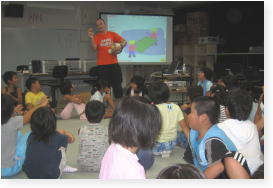 Then we eventually got into the sports theme. The idea was to do the song, then the stopwatch game. But I was using real footballs, basketballs, tennis balls etc. to introduce the words. And straight away the kids were shouting out “Choudai!”. So always keen to jump on to what the kids are wanting to say, the reply is “OK, if you can say it in English, you can have it!”. To which someone replied “Ball please”, which is near enough ( it communicates the idea even if it’s not 100% correct) so I passed them the ball. Then I asked for it back, said thank you and waited a bit, eventually someone else asked for it. So we went into a Koala game, but using the basketballs. As usual one of the aims of Genki English is not what English we want to teach, but what the kids want to say.
Then we eventually got into the sports theme. The idea was to do the song, then the stopwatch game. But I was using real footballs, basketballs, tennis balls etc. to introduce the words. And straight away the kids were shouting out “Choudai!”. So always keen to jump on to what the kids are wanting to say, the reply is “OK, if you can say it in English, you can have it!”. To which someone replied “Ball please”, which is near enough ( it communicates the idea even if it’s not 100% correct) so I passed them the ball. Then I asked for it back, said thank you and waited a bit, eventually someone else asked for it. So we went into a Koala game, but using the basketballs. As usual one of the aims of Genki English is not what English we want to teach, but what the kids want to say.
After a few minutes of them practising “ball please” and “Thank you” ( and me purposely not saying “Thank you” and the kids telling me off for it!), I held up both a basketball and a baseball. The kids were saying “Ball, please”, and I was saying “Eh… I have two?” to which we could introduce the sports names, or rather their English pronunciation, e.g. “the baseball please”. Once they’d gone through and played the koala game with all of the sports from the song ( except badminton as “badminton ball please” doesn’t work!), we had a quick run through the mini lesson and finished on the song, which was OK, but as we’d spent so long on the “review” song they were pretty much shattered and it wasn’t the best lesson ever.
Which was particularly frustrating because 2 of the town’s Junior High School teachers were there. One topic of a second visit is the link between JHS and elementary school. So I introduced myself to them and said in very polite Japanese “I look forward to working with you to build a coherent system between the two schools” to which they replied “Ah, but we have the tests, and we have to teach grammar, and we have to teach writing”…. etc. etc., i.e. the excuse responses of lazy teachers who haven’t bothered to read what they are supposed to be teaching and are going along in the outdated way they learnt in college far too long away. Things have changed, included the entrance exams and more importantly the content of what you are supposed to be teaching in class. Usually I can get around that problem in the workshop, because if you spell everything out in a nice face saving way they go “Oh, that’s good!” and get really excited about what they can do in JHS, as oppose to what they can’t do. But today’s teachers had decided they wouldn’t attend the workshop. Oh well, at least there was a reporter there to catch their comments and be completely dumbfounded by them!
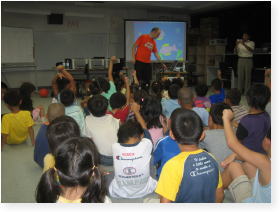 Then it was the 1st and 2nd graders and it was as perfect a lesson as you could hope for. Rock, Paper, Scissors for the review ( I had done it with the 2nd years last year so knew they were fine with it) and Do you like…? as the main theme with Gorilla as the game. They were perfect with the acapella and the song, it always astounds me just how good the lower grades accents are. Amazing. Then in Gorilla I held up a picture card and they had to say “Do you like…?” plus what’s on the card. Quite simple, but they had it down perfect. Then if a gorilla card appeared they had to switch sides of the classroom with me. Just this simple little twist kept them alive and on edge for ages, they could have played the game forever it seemed! So we had finished for the today, but still had a good 10 minutes left ( quick learners!), so I played them the What’s your favourite food? picture book. I was asking them what food they thought each animal liked, and they were shouting out the answers, again with impeccable pronunciation. If this was the second lesson for this theme I would have got them to ask me “Does he/she like…?”, but for today just the food was fine. By the end I was having to stop them repeating the “What’s your favourite food?” line, even though they had never heard it before today.
Then it was the 1st and 2nd graders and it was as perfect a lesson as you could hope for. Rock, Paper, Scissors for the review ( I had done it with the 2nd years last year so knew they were fine with it) and Do you like…? as the main theme with Gorilla as the game. They were perfect with the acapella and the song, it always astounds me just how good the lower grades accents are. Amazing. Then in Gorilla I held up a picture card and they had to say “Do you like…?” plus what’s on the card. Quite simple, but they had it down perfect. Then if a gorilla card appeared they had to switch sides of the classroom with me. Just this simple little twist kept them alive and on edge for ages, they could have played the game forever it seemed! So we had finished for the today, but still had a good 10 minutes left ( quick learners!), so I played them the What’s your favourite food? picture book. I was asking them what food they thought each animal liked, and they were shouting out the answers, again with impeccable pronunciation. If this was the second lesson for this theme I would have got them to ask me “Does he/she like…?”, but for today just the food was fine. By the end I was having to stop them repeating the “What’s your favourite food?” line, even though they had never heard it before today.
So a brilliant lesson. The new head teacher, the reporter and a new, this time cool, junior high school teacher came up afterwards and said “Now we can see what you mean, we have to start with 1st grade!”. Oh yeah.
Finally it was the 5th & 6th graders, the toughest of the day! I was assured that these kids had already learnt the Weather and we could try a more advanced game and maybe even the school lunch project! I was also assured they’d be genki enough to do the song, which they sort of were, but obviously not anywhere near as up for it as the lower grades. Having said that though they did really like the animation that goes with the song on the CD. I’m wondering if just playing the songs to 6th graders may be of some help??
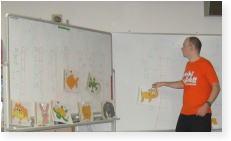 Anyway, after the song we tried the Weather Countries game. But we had both 5th and 6th grades together and not enough staff to go round and check the kids knew where any of the countries were. In fact only a few kids knew any of the countries, even China & Russia ( practically neighboring countries) were completely unknown to them! So that took a while to do.
Anyway, after the song we tried the Weather Countries game. But we had both 5th and 6th grades together and not enough staff to go round and check the kids knew where any of the countries were. In fact only a few kids knew any of the countries, even China & Russia ( practically neighboring countries) were completely unknown to them! So that took a while to do.
Then I set up a banana tree game so we could keep score. It’s difficult to asses the weather, so I asked them the weather and then the temperature for each country, the points would be based on the country.
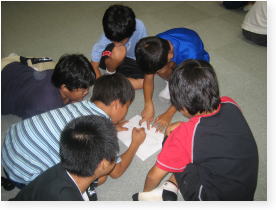 As we had so many kids, when I was asking round, the 6th graders started doing the Junior High School trick of looking away and conferring with their teammates for ages before whispering an answer. So that bad habit had to be fixed! The way I do it is to tell them that it’s downright rude to look away when someone speaks to you ( my change of attitude makes them realise something isn’t right here). To which they go “Eh?”. Then I say, it’s just as rude as if I go into the head teacher’s office and say “Hai, kouchou chan, omae genki na no?” to which they all laugh and from them on I asked them once and they shouted the answer straight back!! Good.
As we had so many kids, when I was asking round, the 6th graders started doing the Junior High School trick of looking away and conferring with their teammates for ages before whispering an answer. So that bad habit had to be fixed! The way I do it is to tell them that it’s downright rude to look away when someone speaks to you ( my change of attitude makes them realise something isn’t right here). To which they go “Eh?”. Then I say, it’s just as rude as if I go into the head teacher’s office and say “Hai, kouchou chan, omae genki na no?” to which they all laugh and from them on I asked them once and they shouted the answer straight back!! Good.
It took a long while to get going with that game, but as the points built up they managed to do quite well and really started enjoying it. If they had studied the weather and numbers when they were younger it would have been a great 6th year lesson where the English is already known and you’re using it to do an interesting lesson.
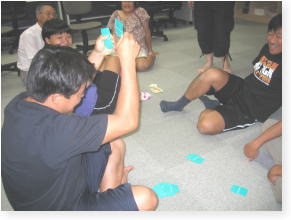 Then after lunch it was the main deal of the day and the teachers’ workshop. For most of the teachers it was the 2nd time, but there were some newbies and were asking “What is this ALT doing trying to teach us?”, so I had to do my self intro which bored all the 2nd timers but really got the attention of the new teachers. We did a quick round of the teachers doing the Warm Up game, in which one teacher said “Do a hand stand” and one of the head teachers did, walking right across the room on his hands! We also did How much?, Bargaining and the card game.
Then after lunch it was the main deal of the day and the teachers’ workshop. For most of the teachers it was the 2nd time, but there were some newbies and were asking “What is this ALT doing trying to teach us?”, so I had to do my self intro which bored all the 2nd timers but really got the attention of the new teachers. We did a quick round of the teachers doing the Warm Up game, in which one teacher said “Do a hand stand” and one of the head teachers did, walking right across the room on his hands! We also did How much?, Bargaining and the card game.
Then after the break it settled down into a chat like session, going through the sorts of worries the teachers have now ( all the basic stuff had been covered last time). I have a feeling the teachers here are too reliant on the ALTs and guest teachers so don’t have the hungriness of teachers who have to teach on their own, but they are now looking at more practical things such as how to fit in practice everyday etc. We also did a session on how they could get good at English themselves and they agreed to make the Wednesday morning teachers’ meeting all in English. On which I shook hands with the head teacher in front of the newspaper reporter! Excellent, that ‘s always a sign of a good school who is serious about getting things done, and 12 months later it always has a huge positive impact on the teachers attitude to English
Then a few more things to tidy up before heading back to the hotel, a nice dinner and back to email work!


